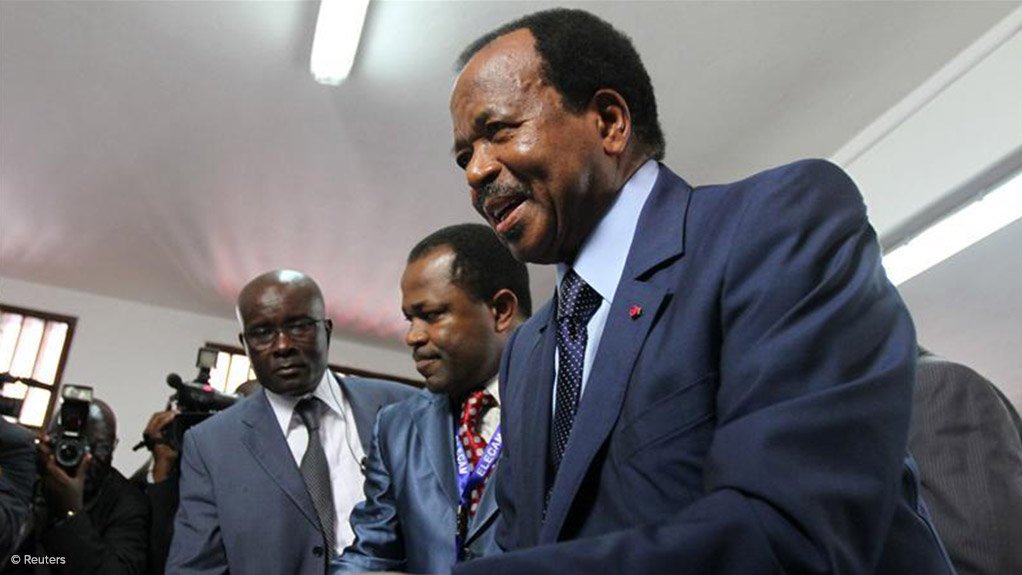Cameroon saw isolated incidents of unrest on Sunday as voting began in an election widely expected to extend the rule of President Paul Biya, one of Africa's last multi-decade leaders.
While voting proceeded smoothly across much of the Central African country, a drive by secessionists to disrupt the election meant not all polling stations were open in Anglophone regions and there were outbreaks of violence.
At least three armed separatists were shot dead by security forces in the northwest English-speaking town of Bamenda, a security source said.
The report could not be independently verified and separatist leaders could not be reached for comment.
Elsewhere, a separatist fighter shot at a convoy of cars carrying journalists, but no one was wounded, according to a Reuters witness.
Biya, 85, has ruled for 36 years and victory on Sunday would give him a seventh term, bucking a tentative trend in Africa to install presidential term limits. The only current African president to have ruled longer is Equatorial Guinea’s Teodoro Obiang Nguema Mbasogo.
In a speech after casting his vote in the capital Yaounde, Biya did not make specific reference to separatist violence.
"The election campaign took place peacefully," he said. "Now we must hope that they (Cameroon citizens) keep this self-control when the results are out."
Oil and cocoa producing Cameroon has seen economic growth of over 4 percent a year since Biya was last elected in 2011, but many of its 24-million citizens live in deep poverty.
A secessionist uprising in the Anglophone Northwest and Southwest regions, home to 5-million people, has cost hundreds of lives and forced thousands to flee either to the French-speaking regions or into neighbouring Nigeria.
In the French-speaking city of Douala, Anglophone voter Christopher Akem said he was voting "for my brothers and sisters, for peace to return to Cameroon as before." He declined to say which candidate he had picked.
In the Anglophone regional capital of Buea neither of two polling stations visited by a Reuters witness was operational as staff did not have sufficient electoral materials.
Fifteen kilometres (9 miles) up the road in Ekona village, a convoy of military vehicles could not deliver materials to a polling station because it was not staffed.
Biya did not visit the English-speaking regions during his campaign. A central problem of his rule has been his long bid to centralise a hugely diverse population in a country founded in 1961 on the promise of federalism and autonomy for its regions.
In 2016, protests by Anglophone lawyers and teachers against the marginalisation of minority English speakers in their professions led to a heavy-handed clampdown, in which unarmed civilians were shot dead. That radicalised many and armed groups formed in the lush forests of the west.
"NO ROADS, CORRUPTION"
Some opposition parties have united in an effort to harness discontent about the country's crumbling infrastructure and about Biya, who they say has ruled Cameroon like a personal fiefdom for too long. The president goes years without convening cabinet meetings and spends long stretches out of the country with his wife Chantal, most often holidaying in Switzerland.
In 2011, Biya won with 78 percent of the vote in an election described by the US Department of State as "marked by irregularities". The odds are still against the opposition, including the main candidate, Joshua Osih of the Social Democratic Front.
"We want a different president," said teacher Christelle Cheddgou in Yaounde. "There are no roads, there is corruption ... Thirty six years is too long and things are getting worse."
Still, of the country's 24-million people, only 6.5-million were registered to vote as of October 1, according to the election authority, reflecting resignation to a continuation of Biya's long rule.
Government spokesman Issa Tchiroma Bakary said the government had put measures in place to ensure the election went smoothly.
"It is not impossible that here and there they may be troublemakers. I am convinced that nationwide the vote will take place," he told journalists after casting his ballot in Yaounde.
The African Union and other organizations are monitoring Sunday's vote, but opposition candidates have already complained of efforts to fix the election in Biya's favour.
EMAIL THIS ARTICLE SAVE THIS ARTICLE
To subscribe email subscriptions@creamermedia.co.za or click here
To advertise email advertising@creamermedia.co.za or click here











